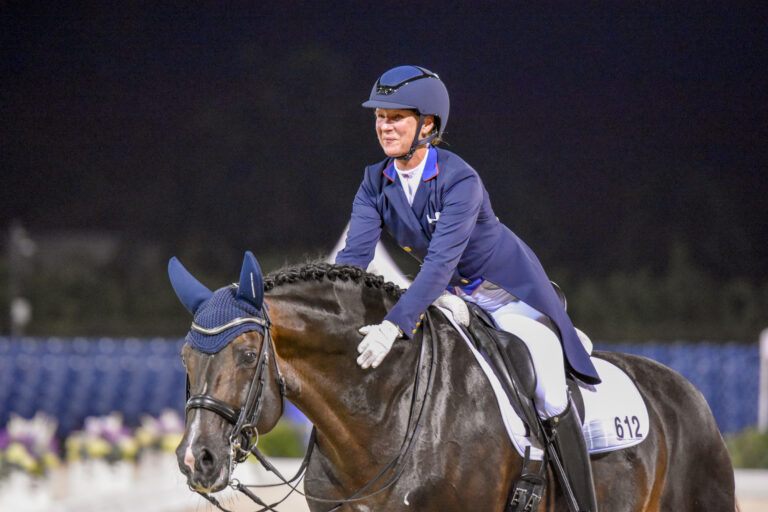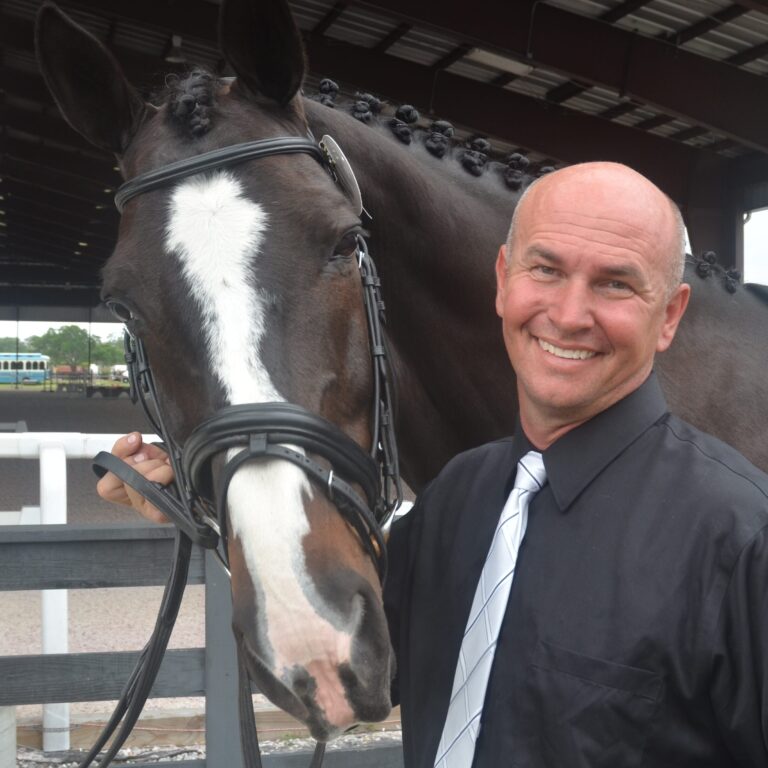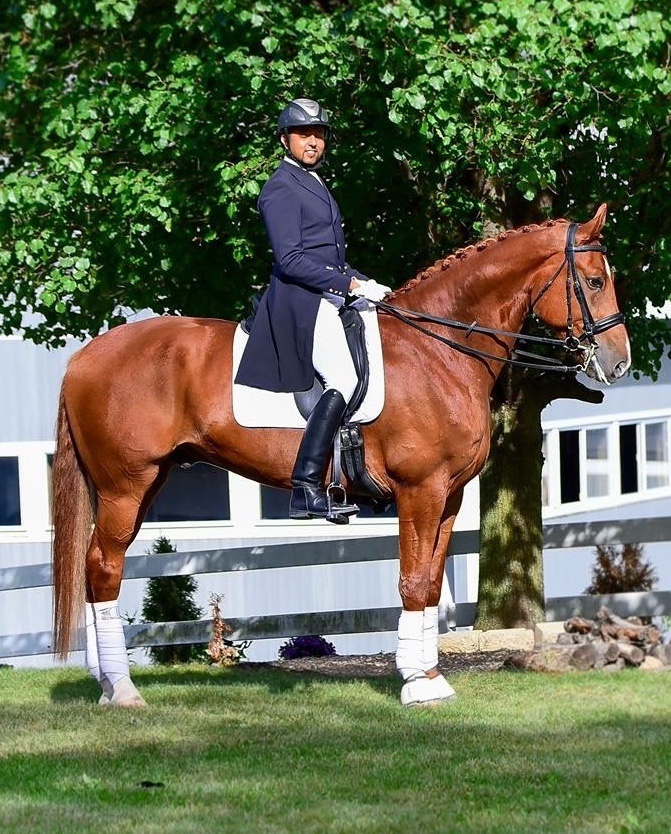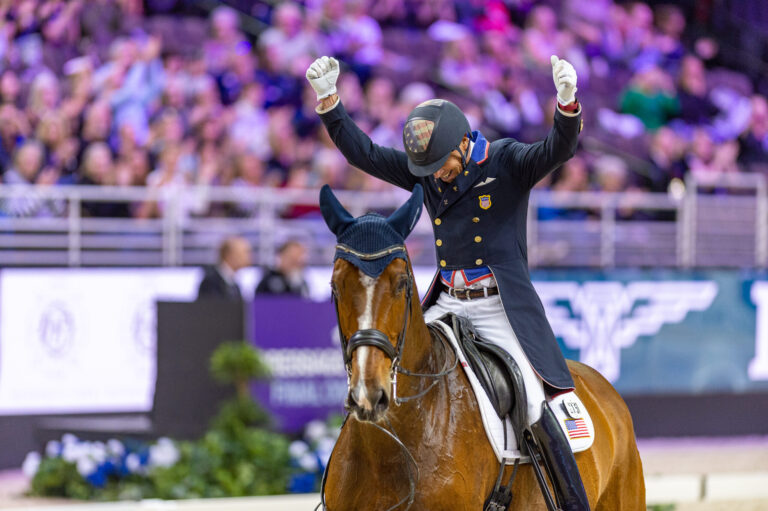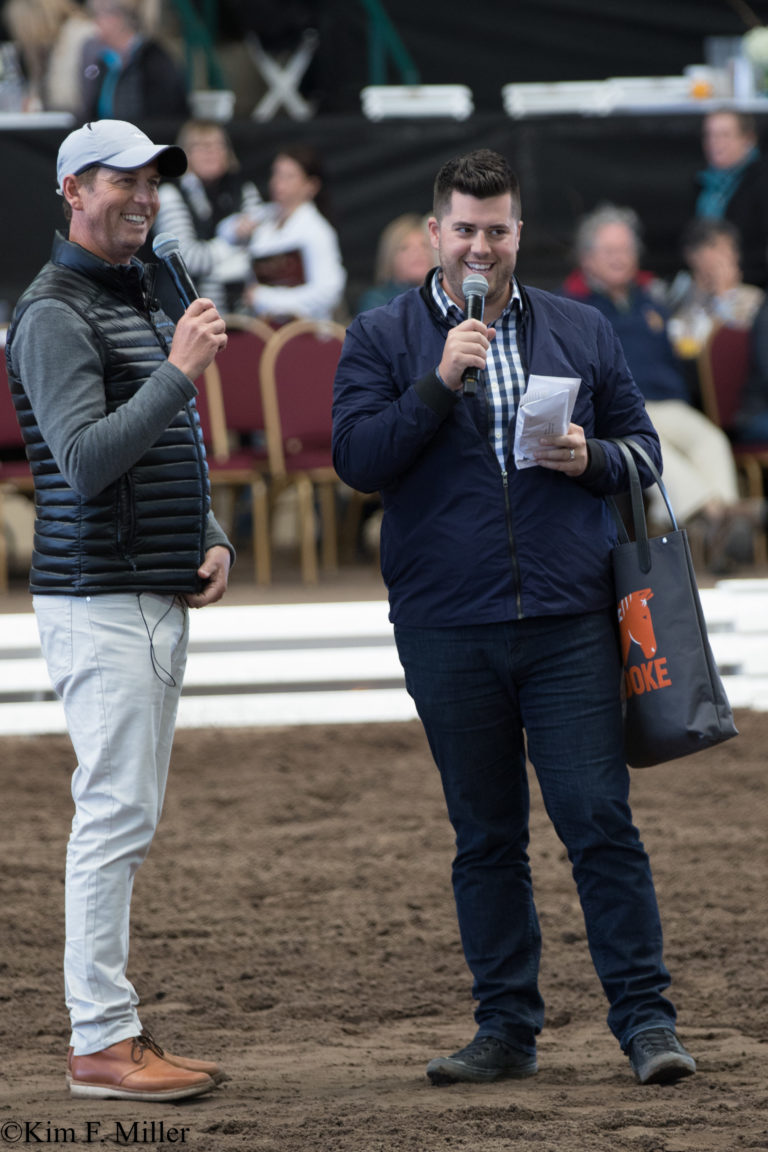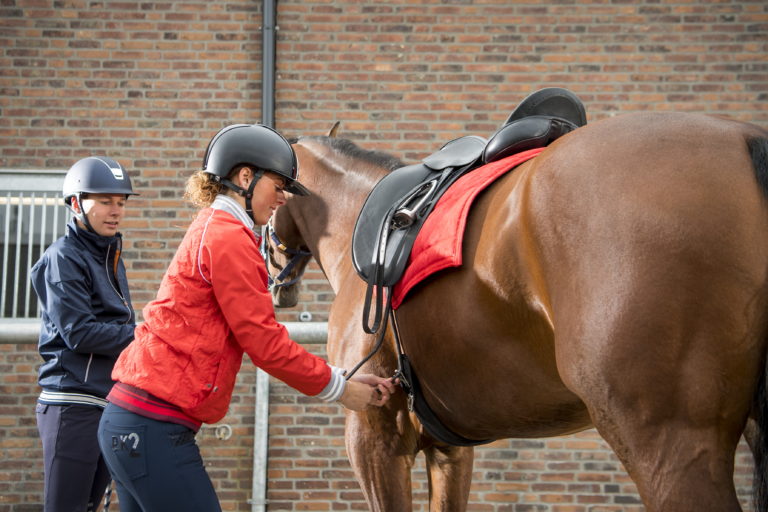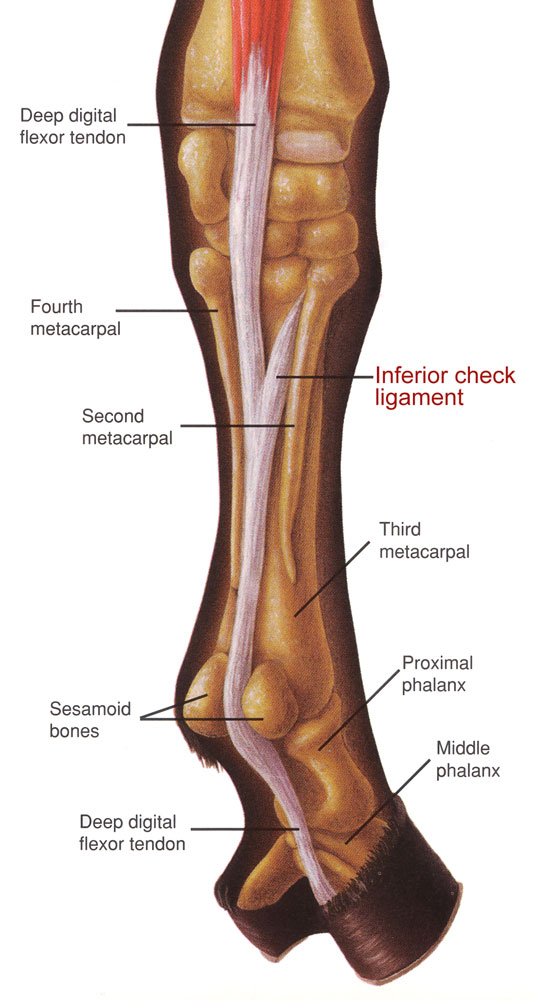The blisters from riding boots; the demanding balance between classic position and flexibility; the fiendish subtle cues and the brain-tease of executing precise patterns: dressage.
Alexander James Ham-Kucharski stews over the same challenges that we all face when tackling the exacting artistry of dressage. “Alex” is a 20-year-old college guy. He arranges his class schedule around his dressage lessons. He competes, too. Alex has autism, cerebral palsy and refuses to surrender to the effects of a stroke.
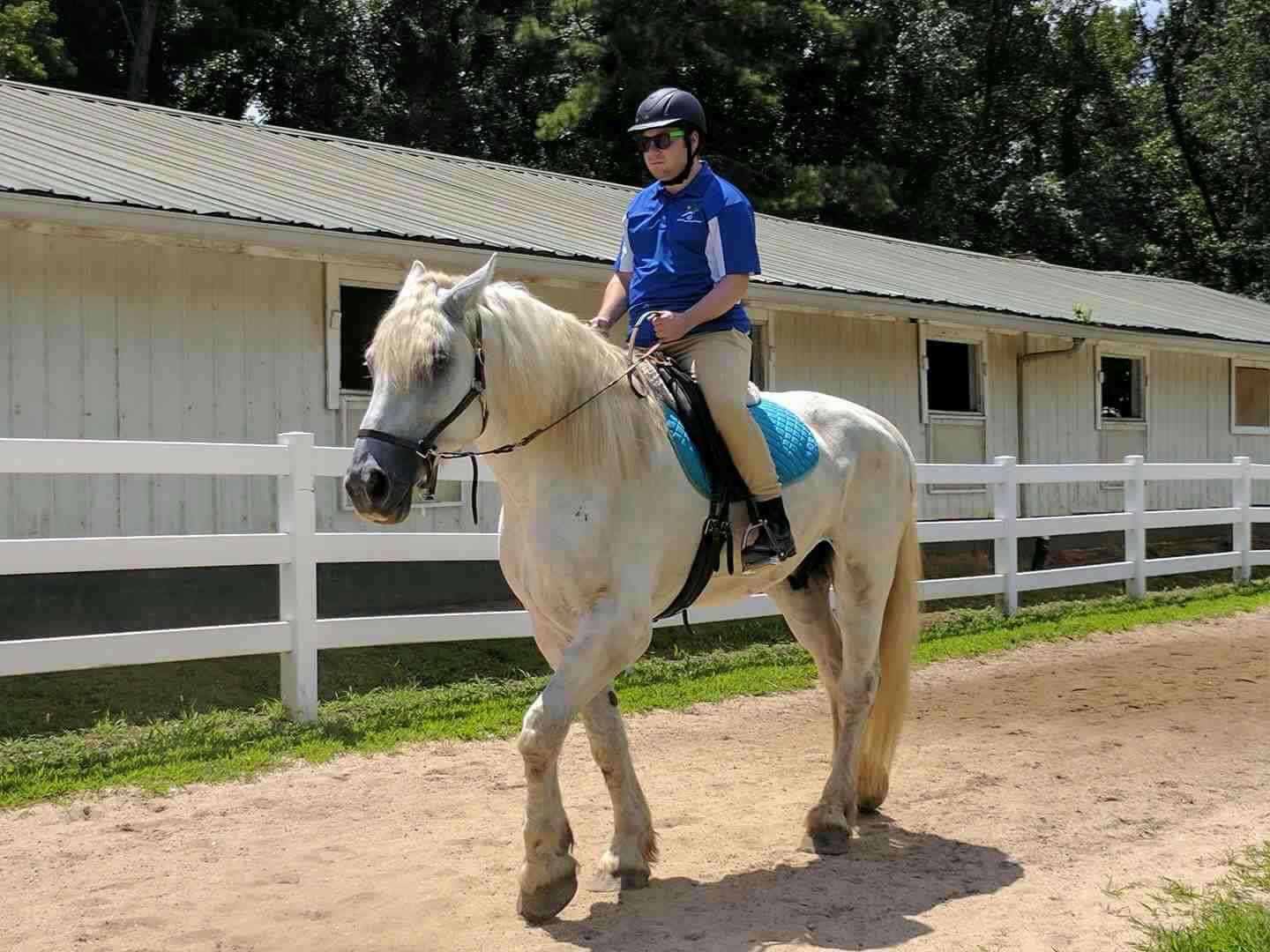
Alex and I met at the Princeton graduation of my granddaughter. He was with his mom, Dawn. While Dawn and I chatted, Alex was riveted to a game on his phone. He did not speak.
Two morsels of conversation grabbed me: Alex has autism and he competes in dressage. I am a late-in-life rider and a beginning dressage student. The execution of dressage with the challenges of autism, at first, seemed like a clash to me.
Speaking with Alex, Dawn and his trainer, Professional Association of Therapeutic Horsemanship (PATH)-certified therapy instructor Edie Ahola at Bearfoot Ranch in Gainesville, Georgia, I realized that Alex and I—and most dressage students—face similar challenges.
A Bit About Autism and Cerebral Palsy. Autism spectrum disorder is a range of conditions characterized by challenges with social skills, repetitive behaviors, speech and nonverbal communication. Autism creates unique strengths and differences from the non-autistic person. Attention deficit and hyperactivity disorders (ADHD), anxiety and phobias can accompany autism.
Cerebral palsy is a neurological disorder. It affects movement, muscle control, muscle coordination, muscle tone, reflex, posture and balance. It can impact fine motor skills (such as manipulating the reins) gross motor skills (like sitting the trot) and oral motor skills (speech).
These words by Waldemar Seunig capture what Alex loves about learning dressage: “The dialogue between two bodies and two souls aimed at establishing perfect harmony between them.”
Alex finds that dressage is a joyful and stimulating way of working to overcome his challenges. Alex brings many challenges to his dressage saddle. We students of the rigors of dressage are in the same tall, stiff, heel-rubbing boots as Alex.
About Alex
Alex sits in a dressage saddle without aid. He competes. He is a member of the Forsyth County, Georgia, Special Olympics dressage team. He has won numerous equestrian medals—two gold for equitation, two gold for showmanship, two silver and a bronze in trail and a bronze for dressage.
Unlike the distant Alex I first met at graduation, Alex the rider had much to share on dressage and what he finds challenging.
“Riding helps to calm me down from stress and paranoia,” he said. “It helps me physically by stretching my legs, which are tight from a stroke and my cerebral palsy. While I enjoy people, horses make me feel safe, and, in turn, I want them to feel safe as well. I began riding when I was six, but only started dressage three years ago. I like participating in dressage because of the new experience. Because I have done very well in it, dressage gives me pride.”
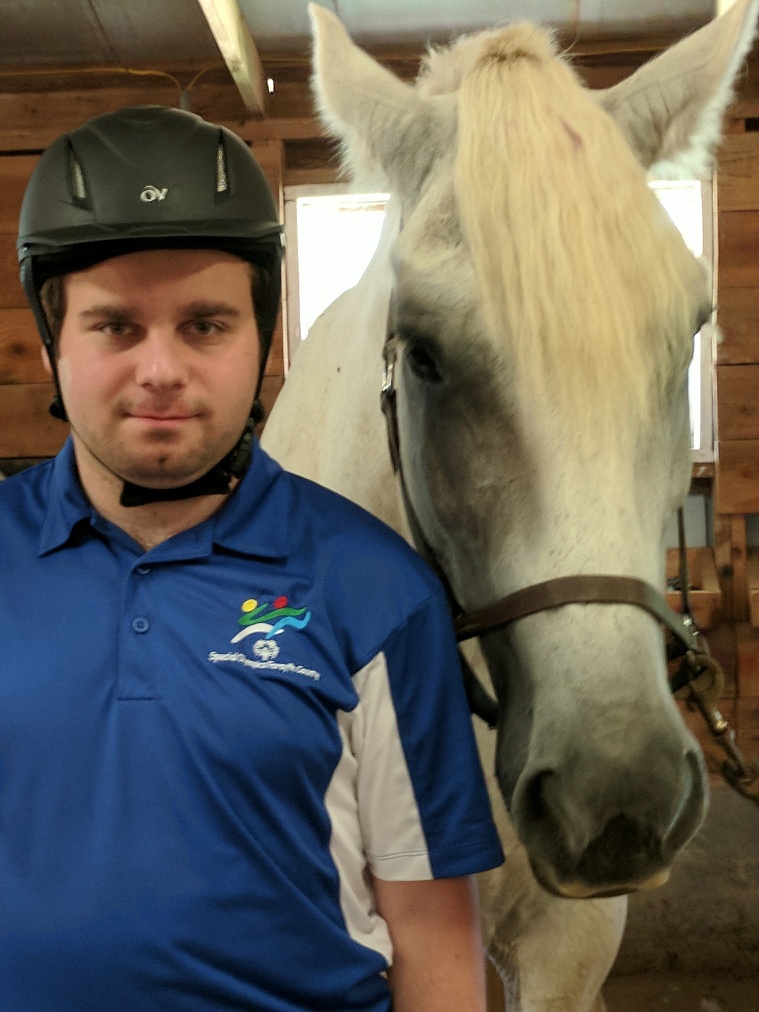
I asked about what was hard for him. “Hearing my coach tell me what to do,” he replied. “I have hearing loss. I was no fan of the belt I had to wear for Western, as I have sensory issues from autism. The belt threw off my focus. I prefer riding English.” Alex and I focus on similar equitation issues like sitting up straight and finding correct contact. “I try to find the perfect spot for me and my horse,” he said.
Was Alex really learning the fine points of horsemanship? He was eager to answer more technical questions, such as how to get the horse to move forward. He told me, “I squeeze my leg or say ‘trot’ or ‘walk.’”
He can now balance in the rising trot. “I like the movement of going up and down. I sit up straight and enjoy the feel of trotting. All the horses I ride enjoy trotting, too.”
Performing patterns is a “mixed bag of fun and work.” Alex likes the patterns. He explained, ‘We ride to a position, pull out an envelope, give the envelope to the judge and move on. But, my legs and core can hurt after performing patterns.”
Helping Alex Learn Dressage
Edie Ahola has owned horses for more than 30 years and has been a PATH-certified instructor for seven years.
I asked Edie to tell me about Alex. “I moved Alex from the equitation class to the dressage class because dressage, I thought, would appeal to Alex’s exacting nature—riding from point A to point B to point C at just the right speed in just the right time,” she said.
Edie shared that Alex’s main challenge is physical. Strengthening his legs, stretching the calf muscles and balance are his focus. She helps him address these issues by concentration on the basic, balanced seat.
I knew nothing of the equestrian Special Olympics, so Edie explained: “The Special Olympics program offers a chance for students with special needs to compete against their peers. The beginner level is mostly at a walk, while the intermediate level includes trotting. The riders have a pattern to follow. Special needs riders are learning to ride, learning the patterns and working to develop the confidence to appear in front of crowds all while dealing with their own disability—physical or mental. The competition offers the riders a chance to hang out with their friends, ride horses and win medals and ribbons.”
We all feel proud of our successes, but competitors like Alex, many who had not shared much in groups, are eager to talk about the horse show and the prizes they won. “Horses are a great confidence boost. If you can handle a 1,000-pound animal, you can handle anything,” Edie added.
Bearfoot Ranch employs rescue horses. “Our rescues come from owner surrender, local animal control, or, in some cases, we went and bought them to remove from a bad situation,” Edie said. For example, Honey is a 14.2-hand, 800-pound Arabian. She was seized by animal control because of abuse. “When we first got Honey, she was distrustful and scared. Over time she began to relax and trust. She’s so sweet and friendly, we hardly recognize her.”
Alex has connected with one horse in particular, named Rocket. “Rocket is a 17-hand Percheron we bought from a kill lot to save him from going to slaughter in Canada. He is putting on weight and Alex’s riding helps get him back into condition,” Edie explained.
Working with the rescues seems to touch the equestrians at Bearfoot Ranch.
A Healthy Body, Mind and Spirit
Dawn Ham-Kucharski is Alex’s mom. Dawn is the co-author of The Autism Book: Answers to Your Most Pressing Questions; an adjunct professor of Composition at Gwinnett Technical College and a member of Quota International of Northside Atlanta, Inc. Dawn is also Alex’s barn chauffeur.
Dawn proves the hour-long drive to Alex’s lessons are worth every mile. “I attribute his pride in being an equestrian as helping him establish success and confidence in all aspects of his life, especially social and educational. Alex is a multiple-medal winner in equestrian, a community volunteer and a 4.0-college student who, years ago, would have been labeled handicapped, cognitively impaired and dependent on society.”
As a teen, Alex had been assessed at possibly never talking or walking and would not be likely receive a high school diploma. “He works so much harder than his peers,” she said. “He never gives up. He will do ten times the amount of work to prove himself, to be included, to be equal. When I see him—on that horse, riding, gaining skill, strength, logic, reasoning, yet so relaxed and content—my pride swells. Sometimes I have just been so tired. Sometimes things for my son, for my family, have seemed so unfair, insurmountable. Then I see Alex, tall and proud in the saddle, on a podium receiving a medal, on a stage holding his diploma, earning A’s in college courses and never giving up . . . well, I just can’t give up either.”
I learned from Dawn that the precision of dressage has improved Alex’s cognition, focus and confidence which extend to all parts of his life. “He was still in need of a wheelchair at age 14. Thanks to bilateral hamstring work, strengthening his core and quads and stretching his heels down in the stirrups for dressage, Alex no longer needs any ambulatory assistance. He knows he can conquer any task laid before him.”
Dawn recognizes that dressage has instilled mental and physical strength, confidence and endurance in Alex. Dressage has not only helped to strengthen his muscles, weakened and tight from his stroke, but he can now memorize and understand multiple-step directions.
“He knows he can work independently,” Dawn said. Dressage, for Alex, is an individual team sport—he and his horse, understanding each other, reading each other, taking clear, concrete direction.
He also earned the responsibility of being a horse handler (leader) for the younger kids at summer camp.
Dawn pointed out that Alex’s accomplishments are his road to success as an adult who can advocate for himself and live independently. “My son has a healthy body, spirit and mind. Alex soars.”
Alex qualified for study abroad in Japan in 2018. He was away from familiar home and family for a month with 20 other students and two chaperones. Alex allowed me to read his required final Journal of Reflection of Study Abroad. I found the essay detailed, insightful, sensitive, funny and educational about the culture—what a professor would expect from any college student.
Alex and I Share a Lesson
Alex and I took a lesson together. I trailed after him as he demonstrated his pattern drills. We performed angled corners and curved corners. We changed gaits at “E” and stopped precisely at “B.” Stop meant “stop” and not “drift out.” Alex’s line to “C” was straight. By Special Olympic rules, Edie walks near Alex during his trots, but Alex trotted on his own when we rode together. Alex responded to Edie’s occasional reminders and encouragement.
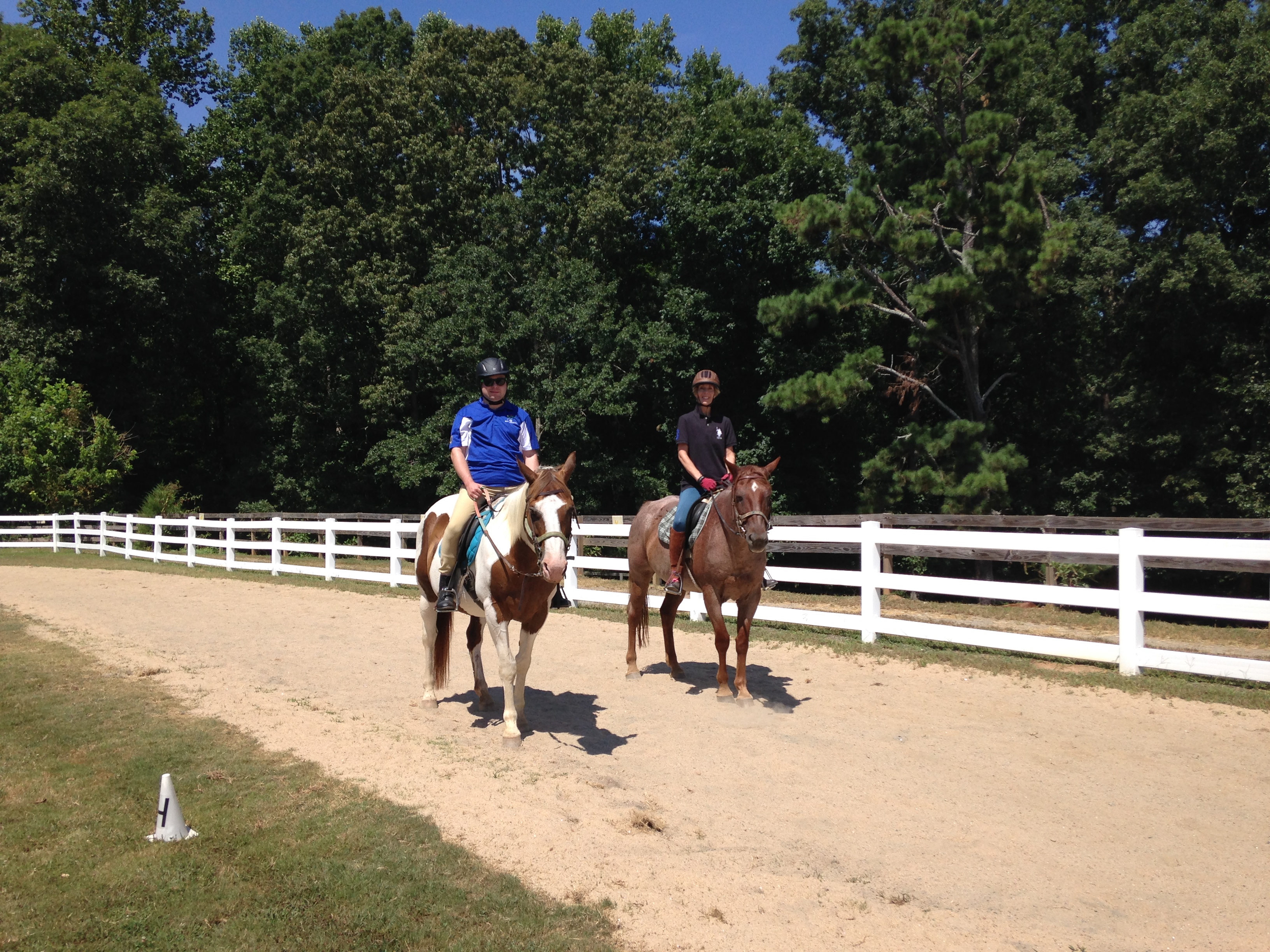
Horses are not all dressage training for Alex. He enjoys escaping the arena to ride in the woods. “I love riding in general, but I really enjoy riding trail,” Alex said. “My coach now trusts me to lead. We go up and down hills and push away branches. Trail riding is satisfying to me because I like seeing nature.”
An hour of schooling in the steaming Georgia heat had us a little damp at the collar. Alex suggested we treat ourselves to a brief post-lesson trail ride into the cool shade of the woods that surrounds the facility. Alex reminded me how to sit in the saddle going up and down the grades to make managing the hills easier for the horses.
To Alex, horses are a source of joy. “I don’t really think about riding in terms of friendship with my fellow athletes—I care about the horses—they make me happy,” he said.
To his mom, dressage gives Alex wings.
If you’d like to learn more about Alex’s story, check out this video that features Alex, Edie and Dawn in a local news story about the Special Olympics!


